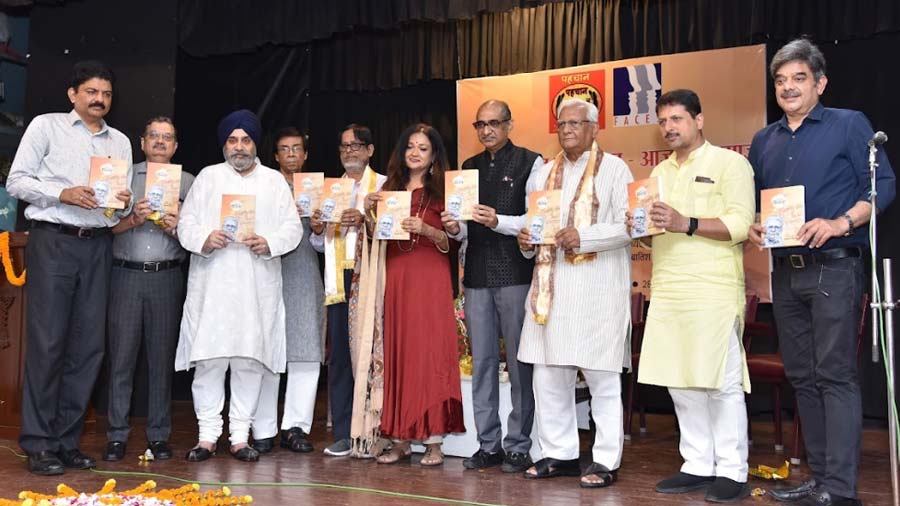Bishambhar Newar has been a prolific figure in journalism. From 2017 to 2022, the chief editor of Taaza TV and Chhapte Chhapte wrote a piece every Sunday about important topical incidents, trying to gain and offer a deeper understanding of it. His book, Ravivariya Chintan is a collection of these weekly concerns for five years. The author unveiled his book at the Bharatiya Bhasha Parishad on August 28.
Newar reminisced about his humble beginnings as a Rajasthani boy, and his struggle to overthrow skewed perceptions. “When I came to Kolkata, I remember seeing people clean the road with water, which was in stark contrast with how one bucket of water was used in Rajasthan to bathe us three brothers. Being from a Marwari family, I was expected to get into business and earn money. The perception was that I just cared about money. When I decided to work in print journalism, I had to fight this bias for years. But things have changed so dramatically with our society. The same family that opposed my passion is supporting my grandson to go to London next month and study journalism,” he said.
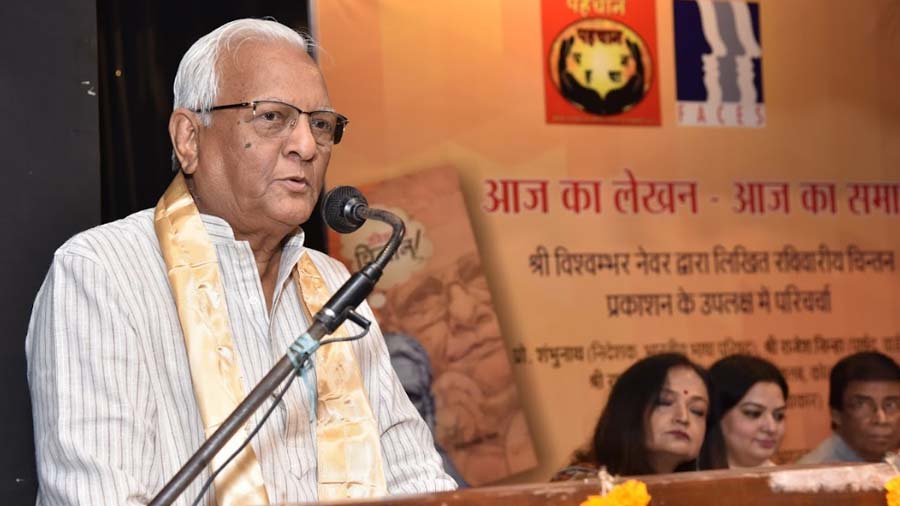
Bishambhar Newar urged people to protect journalism with independent thought
He recognised the pitfalls for today’s media, but signed off on a note of hope. “Today’s journalism is in a grave situation, riddled with media trials and hatred. We need to remember that the day writers and journalists are sold, there will be no line of defence left for society. We need people to fight for journalism’s independence. I look around at the level of education in society and retain hope. It is every educated person’s responsibility to use their resources beyond sustenance, to seek awareness,” he said.
The afternoon saw passionate takes on journalism, Hindi academia and Kolkata by veterans of the industry.
Raj Mithaulia, former chief of the Press Club Kolkata, spoke about the impact of inflation. “This isn’t a topic just for today, it has been an issue since the past century. But no matter when it is spoken about, the price is always paid by the common man,” he said.
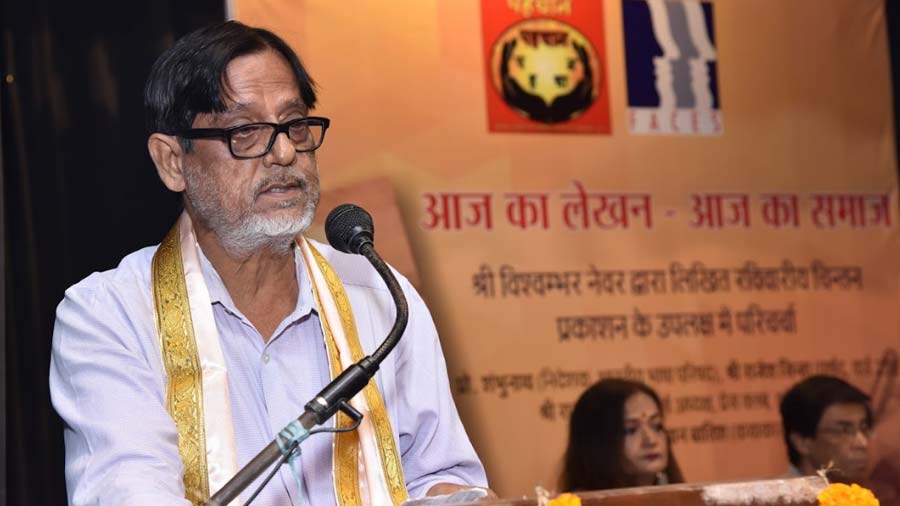
Raj Mithaulia, former chief of Press Club Kolkata, spoke about the impact of inflation
He added that people needed to move on from blame games and actually take accountability to bring about real change. “We blame the government, but the onus is on us equally to take action. One of the key problems of our society is corruption, which is still ingrained in every sector, and is a vicious cycle we need to come out of. While science has increased our lifespan, it has lowered our values. All we want to do is move forward, even at the cost of others.”
Mithaulia also emphasised on the importance of asking the right questions. “The people in power need to raise this issue not just in localities while asking for votes, but also in the Parliament. There is a blame game that goes on in every election. As long as this persists, no true change can happen. The middle class needs to take up this cause because it affects us very brutally,” he said.
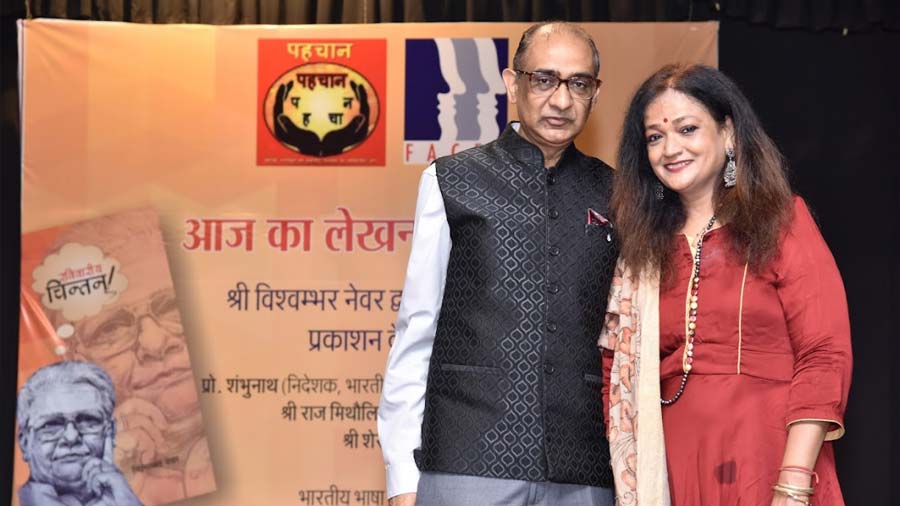
The event was organised by FACES president Imran Zaki and Hindi academic Sudha Jaiswal
Prof. (Dr.) Shambhunath, director of Bharatiya Bhasha Parishad and former HOD of Hindi at Calcutta University, pointed out the destructive qualities of social media on society. “Rising use of social media has led people to forward any news or information without checking its credibility. We have no qualms about sharing half-truths, despite knowing how toxic spreading lies can be. The platform tries to declare bystanders as enemies because it needs a villain,” he said.
He also praised the introspection behind Newar’s book. “Knowledge can only be obtained through chintan (concern). Newarji is expressing chintan at a time where people have stopped thinking. With all big media corporations being commercialised, we are seeing the loss of independent thinking. And in the process, news tries to make us fight with volume, without any regard for sharing information.”
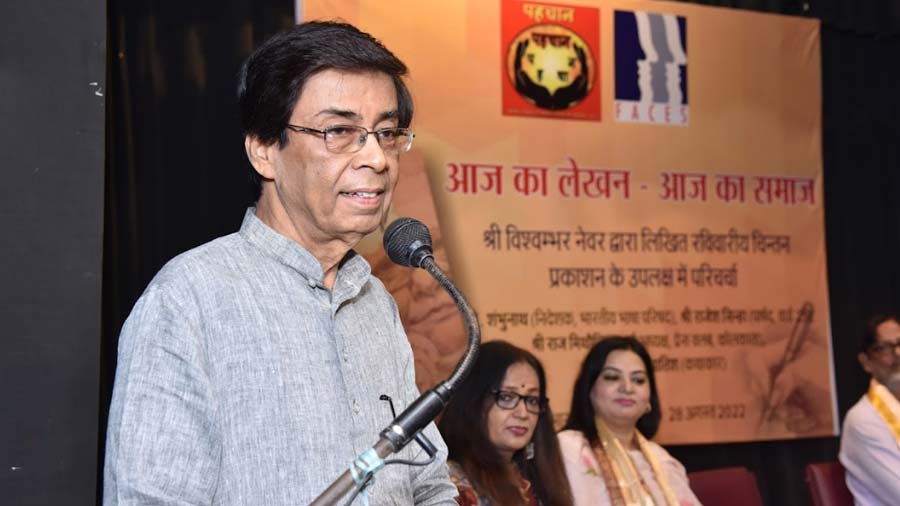
Prof. (Dr.) Shambhunath gave arguments about how social media is affecting society
He further urged people to question the nature of advertising, and who exactly was the commodity. “We don’t even realise that we have been sold. When we see visuals on social media, we don’t have the space to think, but when we read something, we can ponder over it and form independent opinions. This is the difference between a viewer and reader. Much like how Coke can’t replace water, visuals on social media cannot replace reading,” he added.
Ghazala Yasmin, HOD of journalism and mass communication at Aliah University, examined modern journalism’s fall from grace, in contrast with its idealistic roots. “It is important to ask whether today’s journalism meets the gold standard set by the profession that played a huge role in our Independence and ushered in the modernisation of India. Classically, all establishments have been challenged by the independence of the press and it has been called the fourth pillar of democracy. Unfortunately, all newsrooms present information according to a set agenda today,” she said.
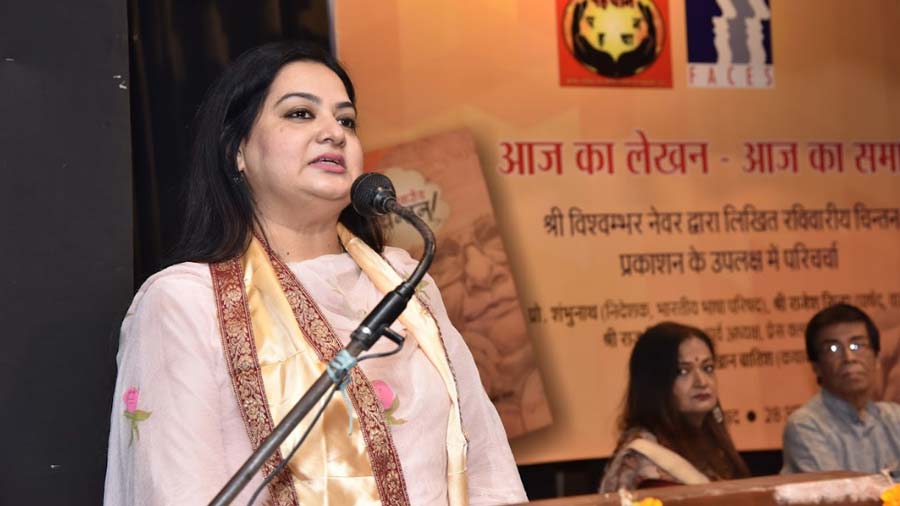
Prof. Ghazala Yasmin examined how modern journalism had strayed from its idealistic roots
She also shared an eye-opening anecdote from her days as an intern at a major media house. “The channel’s top journalist told us that our competition wasn’t with other channels, but Bollywood films and daily soaps. He blatantly said that only what is visible will sell, and news needs to be masala. We are implicated as much as the channels, because of the 24x7 consumption mode, which has dropped our standards and ushered in the era of clickbait news.”
Yasmin urged people to ask the right questions and regain what has been lost. “India has fallen to the 150th spot in the World Press Freedom Index. But all isn’t lost. If social media has degenerated news organisations, it has also given a platform to small independent bodies that show the strength to question people in power. That is the true definition of journalism,” she added.
Rajesh Sinha, the Councillor of Ward 25 (KMC), shed light on why he feels Kolkata is a safe city. “Kolkata doesn’t have a nightlife like Mumbai, but it is still called the City of Joy. This is because of the pacing of life here. I won’t say that it is crime free, but the crime graph is significantly lower here in comparison with other cities.
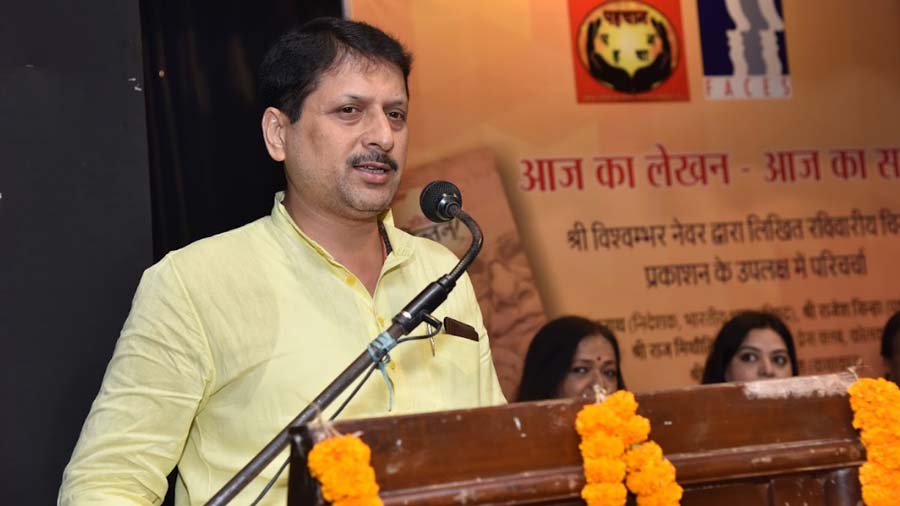
Rajesh Sinha, the Councillor of Ward 25 (KMC), spoke about what makes Kolkata a safe city
